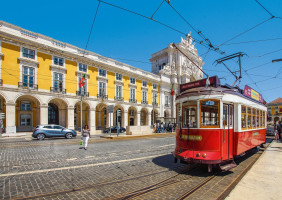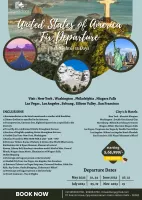Las Palmas de Gran Canaria
Duration
3 to 5 Days
3 to 5 Days
Best time to visit
Apr-May, Sep-Oct
Apr-May, Sep-Oct
Theme
Beaches, Waterfront
Beaches, Waterfront
Las Palmas de Gran Canaria Travel Guide
Las Palmas de Gran Canaria, located on the stunning island of Gran Canaria in the Canary Islands, Spain, is a vibrant city known for its rich history, beautiful beaches, and lively culture. The city boasts a unique blend of Spanish, African, and indigenous influences, making it a fascinating destination for travelers. With its year-round sunny weather and picturesque landscapes, Las Palmas de Gran Canaria is a popular choice for beach lovers and history buffs alike.Top Attractions in Las Palmas de Gran Canaria
- Las Canteras Beach
- Vegueta Old Town
- Roque Nublo
- Casa de Colón
- Bandama Caldera
Las Palmas de Gran Canaria is Famous for
Its stunning beaches and historical sites.Top Attractions in Las Palmas de Gran Canaria
Las Palmas de Gran Canaria offers a range of attractions and experiences for travelers to enjoy:- Relaxing on the golden sands of Las Canteras Beach
- Exploring the historic streets of Vegueta Old Town
- Hiking to the iconic Roque Nublo rock formation
- Visiting the Casa de Colón museum
- Admiring the volcanic crater of Bandama Caldera
What's Great about Travelling to Las Palmas de Gran Canaria?
- The perfect destination for beach lovers
- Rich history and cultural experiences
- Great weather all year round
What's Not So Great about Travelling to Las Palmas de Gran Canaria?
- Can get crowded during peak tourist seasons
- Limited public transportation options
- Some areas may be hilly and challenging to navigate
Travel Tips for Las Palmas de Gran Canaria
- Check visa requirements before traveling
- Renting a car is recommended for exploring the island
- Stay hydrated and use sunscreen due to the sunny climate
Important Las Palmas de Gran Canaria trip information
- Ideal Duration: 5-7 days
- Best Time to Visit: Spring or Fall for pleasant weather
- Nearby Airports and Railway Stations: Gran Canaria Airport and Las Palmas Railway Station
Per Person
60,518
*EXCLUDING APPLICABLE TAXES 5.0 Ratings
( 377 Reviews )
( 377 Reviews )
Per Person
3,60,000
*EXCLUDING APPLICABLE TAXES 5.0 Ratings
( 80 Reviews )
( 80 Reviews )
Per Person
90,256
*EXCLUDING APPLICABLE TAXES 5.0 Ratings
( 377 Reviews )
( 377 Reviews )
Per Person
5,65,999
*EXCLUDING APPLICABLE TAXES Per Person
1,09,989
*EXCLUDING APPLICABLE TAXES 5.0 Ratings
( 377 Reviews )
( 377 Reviews )
Per Person
1,00,089
*EXCLUDING APPLICABLE TAXES 5.0 Ratings
( 377 Reviews )
( 377 Reviews )
FAQ's on Las Palmas de Gran Canaria
Q1: What is the best time to visit Las Palmas de Gran Canaria?
Las Palmas de Gran Canaria enjoys a pleasant climate year-round, making it a great destination to visit at any time. However, the best time to visit is typically from May to September when the weather is warm and sunny. This period also coincides with many festivals and events, offering a vibrant atmosphere for tourists. If you prefer fewer crowds and milder temperatures, consider visiting in the shoulder seasons of spring and autumn.
Q2: Do I need a visa to travel to Las Palmas de Gran Canaria?
Travelers from the Schengen Area, the EU, the UK, and many other countries do not need a visa to visit Las Palmas de Gran Canaria for stays of up to 90 days. However, it's essential to check specific visa requirements based on your nationality before traveling. Make sure your passport is valid for at least three months beyond your planned departure date.
Q3: What are the must-visit attractions in Las Palmas de Gran Canaria?
Las Palmas de Gran Canaria offers a wealth of attractions for visitors. Don't miss the historic district of Vegueta, with its charming colonial architecture and museums. Relax on the stunning beaches like Las Canteras and Maspalomas, or explore the natural beauty of Bandama Caldera and Palmitos Park. Visit the impressive Cathedral of Santa Ana and the modern Las Arenas shopping center for a mix of history and contemporary culture. Enjoy water sports, hiking, and vibrant nightlife to get a taste of everything this city has to offer.
Q4: Is Las Palmas de Gran Canaria a safe place to travel?
Las Palmas de Gran Canaria is generally a safe destination for tourists. Like any city, it's advisable to take standard safety precautions such as avoiding poorly lit areas at night and being aware of your surroundings. The city center and tourist areas are considered safe, but it's always recommended to keep an eye on your belongings in crowded places. In case of emergencies, know the local emergency numbers and have copies of essential documents stored securely.
Q5: What is the local currency in Las Palmas de Gran Canaria and can I use credit cards?
The local currency in Las Palmas de Gran Canaria is the Euro (€). ATMs are widely available throughout the city, and major credit cards are accepted in most establishments, especially in tourist areas. It's always a good idea to carry some cash for smaller purchases or in case you visit more remote locations. Notify your bank before traveling to ensure your cards will work abroad and inquire about any foreign transaction fees.
Q6: What is the local cuisine like in Las Palmas de Gran Canaria?
Las Palmas de Gran Canaria boasts a diverse culinary scene, influenced by Spanish, African, and Latin American flavors. Indulge in fresh seafood dishes like "papas arrugadas con mojo" (wrinkled potatoes with spicy sauce) or "vieja sancochada" (boiled parrotfish). Don't miss out on traditional Canarian dishes such as "ropa vieja" (shredded beef stew) and "puchero canario" (Canarian stew). Sample local cheeses, tropical fruits, and delicious desserts like "bienmesabe" (almond cream). Explore the local markets for a true taste of Las Palmas de Gran Canaria's gastronomy.
Q7: What transportation options are available in Las Palmas de Gran Canaria?
Las Palmas de Gran Canaria offers various transportation options for getting around the city and exploring the island. You can use the efficient bus network to travel within the city and to neighboring towns. Taxis are readily available and can be hailed on the street or booked through apps. Car rental services are also popular for more flexibility in exploring the island's attractions. Additionally, cycling and walking are great ways to navigate the city center and enjoy its sights at a leisurely pace. Ferries and boats provide connections to other Canary Islands for island-hopping adventures.
Q8: Are there any cultural norms or etiquette I should be aware of when visiting Las Palmas de Gran Canaria?
When visiting Las Palmas de Gran Canaria, it's essential to respect the local customs and etiquette. Greet people with a handshake or a kiss on the cheek if you're comfortable, especially when meeting someone for the first time. Spaniards appreciate punctuality, so be on time for social gatherings and appointments. Dress modestly when visiting religious sites or local neighborhoods. It's customary to leave a small tip of around 5-10% in restaurants and cafes if a service charge is not included. Learn a few basic Spanish phrases to show respect for the local language and culture. Above all, be friendly, open-minded, and enjoy the warm hospitality of the Canarian people.
Q9: I am a travel agent. How can I buy travel leads of Las Palmas de Gran Canaria?
Register yourself as a travel agent at agents.tripclap.com and then you can buy travel leads to Las Palmas de Gran Canaria once your account is approved. For more details contact our support team at +91-8069186564 or support@tripclap.com






